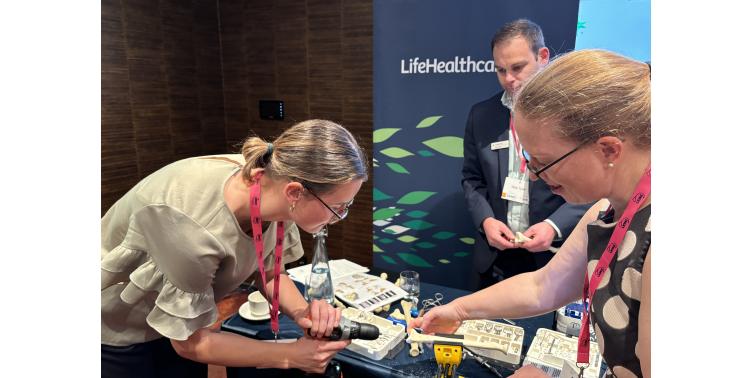I’m a 5th-year medical student at the University of Otago, Christchurch campus. I’m in my second year of hospital and community rotations around hospitals across the Christchurch region. If you’d told me a year ago that I had just spent the weekend at a Ladies in Orthopaedics conference, I would have been rather bewildered.
Orthopaedics was the one specialty I had immediately written off as an option before even trying it. Orthopaedic surgery existed in my head as a Venn diagram circle completely separate from other circles including ‘female’, ‘family’ and ‘not glorified carpentry’. Despite not considering anything else about the specialty, my brain immediately told me that I didn’t look or behave like an orthopaedic surgeon. This preconceived belief was so strong that it overrode my usual approach to considering any other specialty, where I mull over things like the type of work they do, and which groups of patients they work with. This was only confirmed when the one orthopaedic surgeon I’d seen talking to my consultant in my fourth year was aggressively male, about 6’5, wearing some giant gumboots and proudly looked as though he’d stumbled out of a meat works. I figured I’d both hate it and never be able to do it.
This all continued until about three months ago when I started my orthopaedic run. I had ridiculously low expectations - I thought the all-male surgeon posse would be sexist and cruel and I’d hate it. However, I ended up having an absolutely brilliant time. Something about the combination of dad having taught me to use a drill (on construction projects, not humans), my sporting background making me passionate about helping athletes and restoring mechanical function, strength from water polo training and the excellent teams just clicked. Unfortunately, when Otago University emailed us a three-page list of all the Orthopaedic surgeons and their subspecialty interests, literally only one was a female. As said by Marian Wright Edelman, quoted in Nikki Hooper’s conference talk “You can’t be what you can’t see”. I was no male rugby bro, and I most certainly do not have a housewife to make my lunches for me (two stereotypical requirements my brain had also managed to believe in). However, the wheels started churning in my head. I did well in the run, even if that was being praised for having large hands and knowing about sport, the boyish qualities that helped me fit in.
Changing The Narrative
Thankfully, I ended up hunting out a paediatric orthopaedic list with the singular female orthopaedic surgeon in the department - Nikki Hooper. Nikki was more than obliging, super welcoming and I had an amazing time joining her congenital hip case. My mind was blown. Nikki has four children (children and surgery were two other non-overlapping Venn diagrams in my head), is not six-foot-tall and also does not play rugby. She was more interested in how enthusiastic and excited I was and how that would translate well to an orthopaedic career, rather than praising my hand size.
She asked if I or other girls in my class were coming to the annual LIONZ conference, open to medical students and doctors interested in Orthopaedics. I told her we all considered ortho a boys' club, something seemingly unattainable for us. I explained how I had somehow almost written off a surgical career entirely after one year in the hospital, despite thinking anything was within reach at the way until my fourth year. I grew up believing that if you wanted something enough you just had to work hard at it, whether that was performing at rowing nationals or getting good grades in physics. I was naively pretty unaware of being female in general in pre-clinical years too, with over half our medical class being female. However, on about day 3 of my first 4th year placement in General Surgery, my male consultant asked what I wanted to do. I replied Obstetrics and Gynaecology, and he responded with; “what about all the night shifts? You’d have to spend so much time away from your family and kids?” I remember frowning, confused. So far I’d spent years trying my hardest to avoid getting pregnant, and other than that mostly forgetting that I had a working uterus. It had definitely never been brought up in a conversation like this before. I had never considered that perhaps I was supposed to start thinking about my 21-year-old uterus being wasted away by a high-powered career?
It happened again a few weeks later when I assisted in an emergency vascular surgery case at 2 am, beyond excited about retrieving the clot and restoring circulation to an ischaemic limb. Afterwards, the registrar asked how I found it, and I replied that ‘it was amazing but I’m trying hard to not like surgery because of the family sacrifice’. He laughed and informed me he had a ‘lovely housewife’ to compensate for him never being home. He suggested perhaps I just ‘get one of those’. So about 6 weeks after starting, I had switched from thinking anything was possible, to now believing that perusing surgery was a massive sacrifice and that I needed to start house-husband hunting immediately. The most striking about all of this was the complete lack of any of this chat with my male colleagues. In contrast, a few years ago when my partner (male, sporty, plays rugby) was a final year medical student on his orthopaedic surgery run, the boss (after knowing him for mere weeks) informed him that ‘if he was interested he would get him on the training programme’.
Nikki was suitably horrified and apologetic, but also, sadly, not surprised. She told me that this blatant sexism is very constant in a male-dominated field, but also, that orthopaedics is changing - more than half of the registrars NZOA selected for training last year were female, and the culture is improving. I was curious and let myself get mildly excited, leading to Nikki and her amazing LIONZ organiser Nikki Wright arranging for full sponsorship through , and after that, I was off to LIONZ2024!
I would like to extend the biggest thanks to LifeHealthcare for allowing me to attend LIONZ. It has, to put it mildly, been life-changing. I was teetering precariously on the edge of letting myself admit I love surgery beforehand, having just polished off my orthopaedic run. Those two days were everything I needed, and I am so grateful for LifeHealthcare for realising how important empowering females in medicine is.
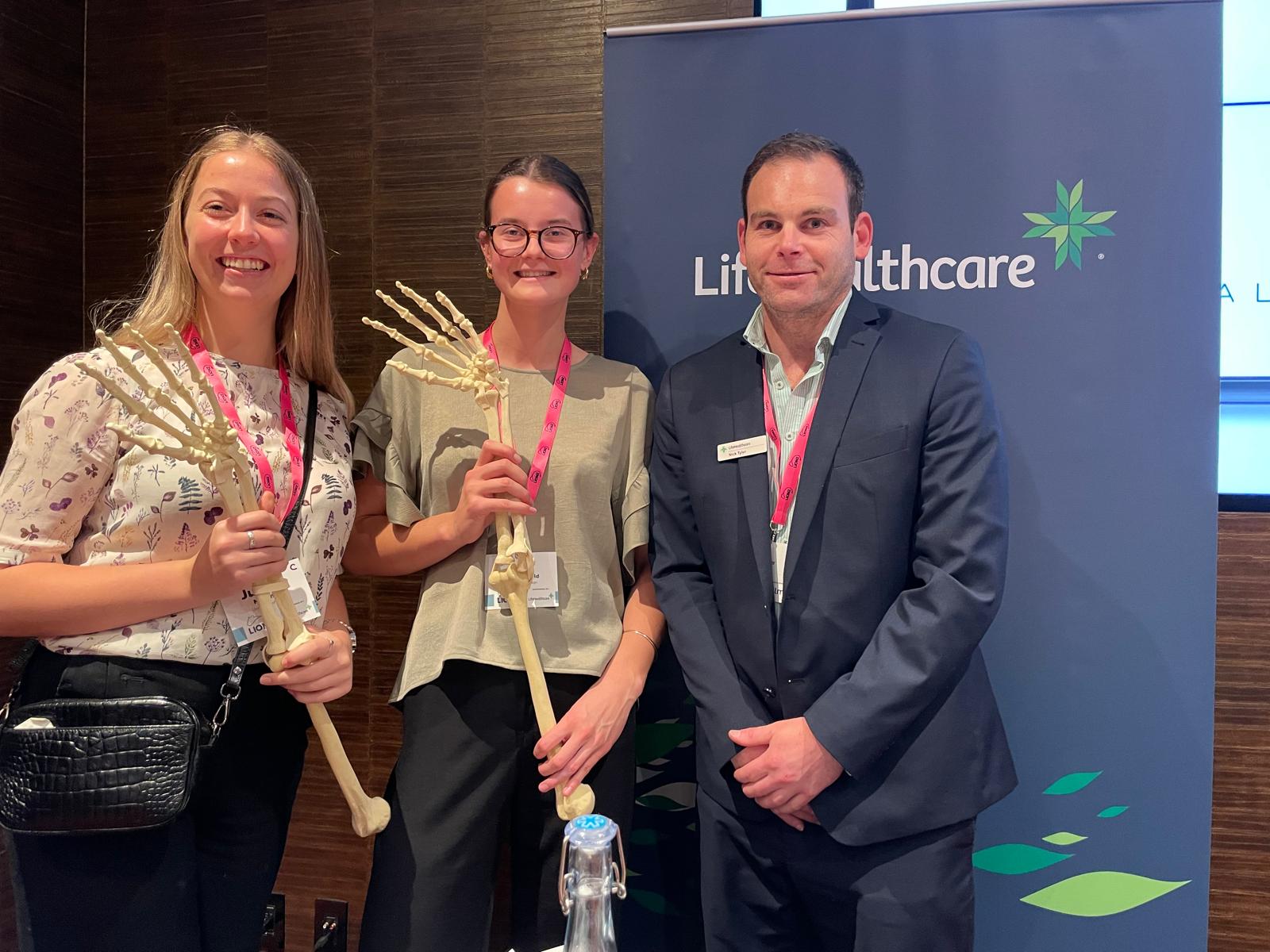
LIONZ consisted of two epic days in Auckland, New Zealand. Saturday morning sawbones workshop consisted of a myriad of different stations to try and learn about – external fixation of fractures, drilling and placing screws and plates, arthroscopic exploration of knees and shoulders, to name a few.
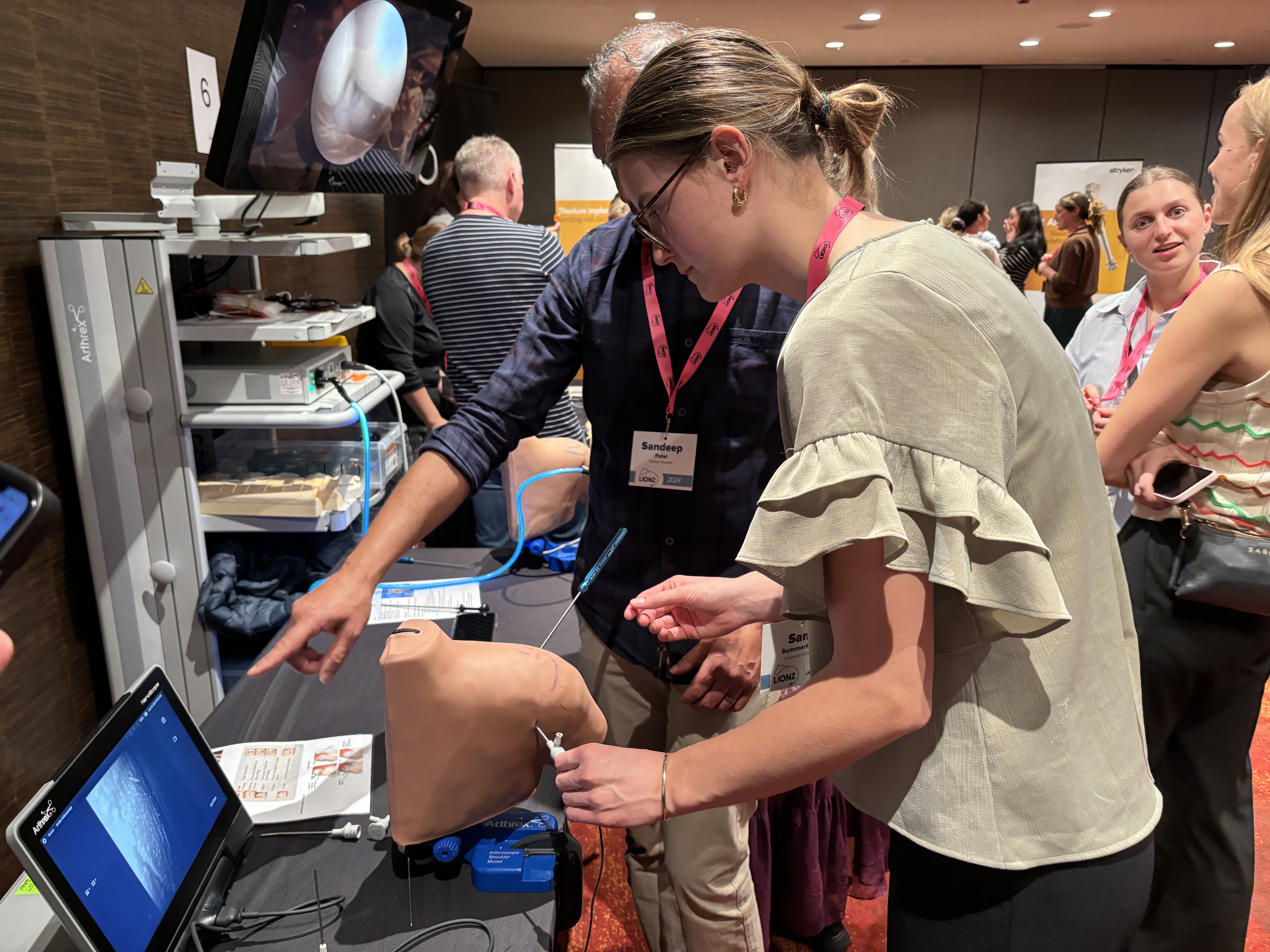
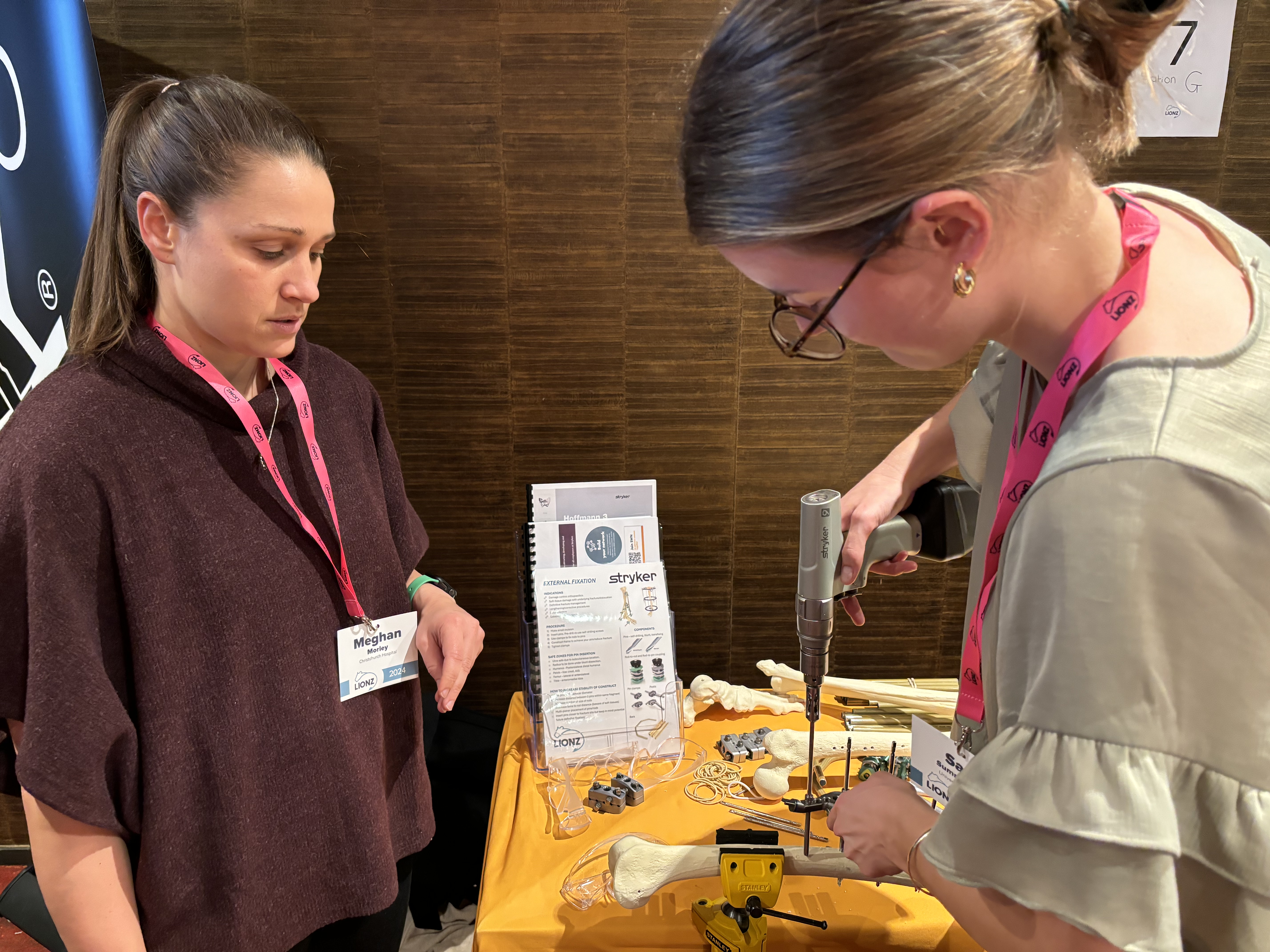
It was a great opportunity to start feeling more comfortable around the equipment and understand the processes required to reach different treatment aims. The afternoon speakers on Saturday were incredible. The keynote speaker Michelle Dickinson, engineer and nanotechnologist, had all three of us students almost in tears by the end of her talk. She spoke so eloquently about the importance of diversity in workspaces, that males and females approach problems with different methods of thinking and thus representation is crucial to achieve the best outcomes and performance. Most striking were her countless encounters where despite this fact, being female had excluded her from opportunities for job promotions, being taken seriously in the workplace, and overall being in positions that would empower further change. Her journey through getting very frustrated with these barriers, and eventually finding ways to create large-scale change, was very motivating. I spoke with her again later at the gala dinner (another incredible opportunity to network with surgeons, registrars and other medical students) about how she continually maintained her drive to create change and empower other females to pursue STEM despite how much discouragement she faced. Michelle described constantly seeing change, even if small, occurring everywhere. Although men often have the upper hand of feeling brilliant and limitless as soon as they exit the womb, there are so many systems now in place that are encouraging females to start feeling the same.
The most important learning that has come out of this entire experience was that there were so many factors leading to ‘a year ago me’ being confused that I was attending an orthopaedic conference. As explained by the amazing keynote speaker Michelle, these ideas began forming when I was as young as five. Ideas about where females belong in society (not in the science field), about high-powered jobs being suited to men, about females being incapable of being orthopaedic surgeons. In contrast, I talked to some first-year male medical students from Australia recently at another surgical conference. All three of them immediately stated ‘ortho’ when I asked what they were interested in. They had never even stepped foot in a hospital before. When asked why, they said – “I dunno, it looks cool”. They have been raised from the age of five to believe that that career is indeed for them, and they sure as hell didn’t have 20 years previous to that moment subtly informing them to pursue something that suited factors such as family or their reproductive organs. They would’ve picked up a drill or jumped in the water polo pool at young ages and men would’ve looked on proudly from the sideline ‘Look at little Johnny, he’ll probably be an orthopaedic surgeon when he’s older!’. I could’ve been in the same mixed polo game, swimming circles around Johnny, and the dads wouldn’t have given it a second glance. This pipeline of losing girls to fields like orthopaedic surgery has many leaks along it, but attending a conference like LIONZ is stemming a very important area of the pipe. Clinical medical students who are still fresh and excited, but have just begun the 1-2 year slide of slowly suscepting to the insidious sexist conditioning without realizing it. If a few more girls each year can come join these amazing women, learn about the career, have a blast picking up the equipment, witness epic role models and go back home and tell their other friends about it, we might have another 5-10 girls per year keep orthopaedics penciled in on their list. And for now, I’d say that is most certainly a big step in the right direction.
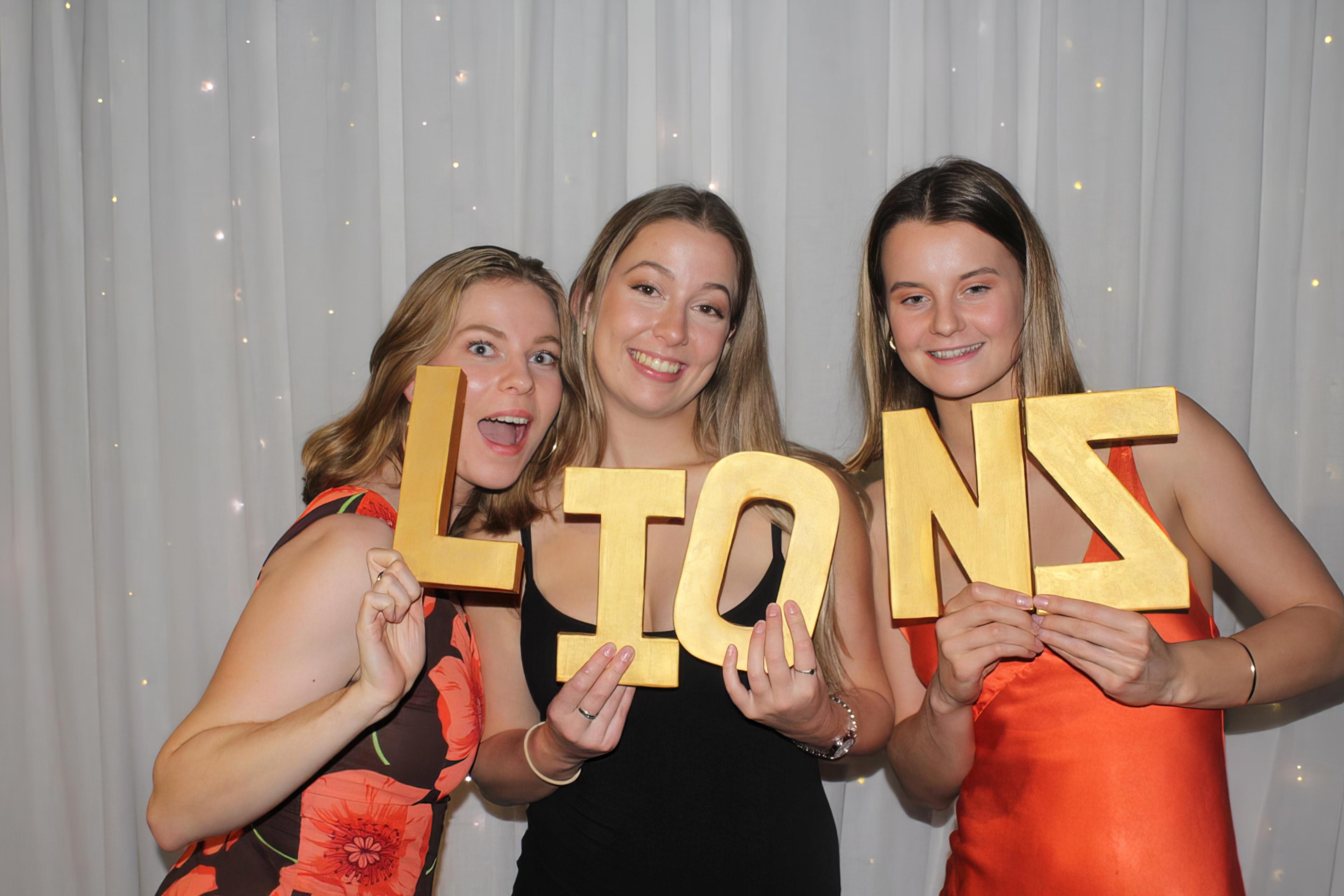
During the informal Sunday session of LIONZ, I watched the pre-training registrars conduct interview practice. I followed one registrar the entire session, seeing how she structured answers around her passion for the specialty, and how she would handle difficult situations and emergencies. By the end of it, all I could think about was how good of a surgeon she would be. Being female was so wildly irrelevant to that fact because IT SHOULD BE IRRELEVANT. That sounds overly simplistic, but that was the most important final message that I was left with at the end of the conference. An exciting update is that while I was in the process of writing this blog, I learnt that the amazing wāhine I was following during interview practice was selected for training following her recent proper interview!!!!! I feel incredibly inspired knowing I had the opportunity to see her demonstrating her passion in front of me, and how that passion translated into how brilliantly she will perform in this field throughout her career. It felt like a very fitting end to how adequately this entire experience blew the “you can’t be what you can’t see” barrier out of the water for me in such a short few days, suddenly morphing orthopaedics into something that now feels very much achievable for me and other females. I walked away thinking about how orthopaedics is about passion for restoring function and mobility, improving pain and limitations, and being innovative in solving difficult problems.
Definitely not about being a 6’5 male wearing giant gumboots.
